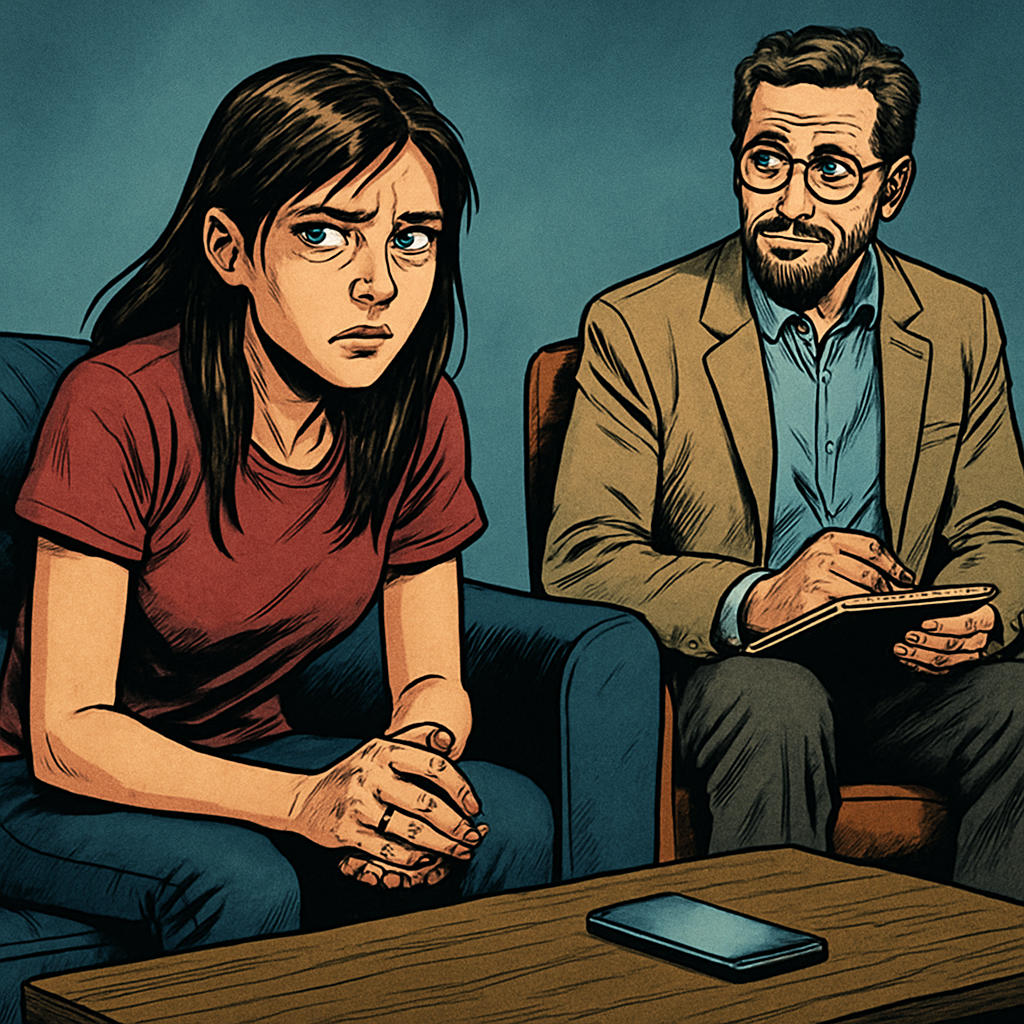🚩 When Trust Is Already on Life Support
I once watched a woman spend forty-five minutes trying to convince herself that the stop sign she just drove through wasn’t actually red. “Maybe it was more of an orange-ish color,” she insisted to the officer. That’s what popped into my mind when Ava K walked into my office, clutching her phone like it contained nuclear launch codes.
Ava was a 22-year-old grad student with eyes that darted around the room as if looking for escape routes. She had this habit of twisting a specific ring on her middle finger whenever she mentioned her boyfriend – a subtle tell I noticed immediately. What struck me most was her elaborate system for sharing intimate photos: specific times, specific lighting, and always including a tiny, nearly invisible mark somewhere in the frame. “It’s my digital fingerprint,” she confided. “So I can prove it’s mine if it ever ends up… somewhere else.”
The level of calculated protection revealed volumes about her underlying fear. 😰
💔 The Emotional Gymnastics of Minimization
Within minutes of our first meeting, Ava laid out her situation: two years of long-distance romance with a boyfriend who had repeatedly violated her digital boundaries. What fascinated me wasn’t just the violations themselves, but the elaborate emotional gymnastics she performed to minimize them.
Trust violations activate what I call “threat-scanning emotional bytes” – heightened vigilance patterns that put your entire system on alert. These aren’t just feelings; they’re complex packages of physical sensations, emotional charges, and protective narratives that evolved to keep us safe.
“But people do way worse things, right?” Ava asked, her voice climbing an octave. “I mean, he’s not physically cheating.”
This is the classic comparison trap. We instinctively compare our pain to theoretical “worse” scenarios to invalidate our own legitimate distress. It’s like saying paper cuts don’t hurt because amputations exist.
🎭 The Love Bombing Smokescreen
What was most revealing wasn’t the boyfriend’s boundary violations – it was the predictable pattern that followed. After each transgression: tears, dramatic declarations, love bombing, and the cycle would reset.
These cycles create “emotional whiplash.” The intense contrast between violation and validation creates a powerful frame where simply returning to “normal” feels like relief. Your nervous system becomes addicted to the dramatic reconciliation, reinforcing a script where boundary violations become the necessary precursor to feeling loved.
“He records every video call where I’m… you know,” Ava admitted, staring at the floor. “He swore he deleted them, multiple times. But now he’s admitted he kept them all.” Then came the kicker: “But he said he only did it because he loves me so much.”
Let’s be brutally honest: secretly recording someone’s intimate moments isn’t an expression of love – it’s a fundamental betrayal of consent. 🚫
🌍 Distance Creates the Perfect Cover Story
Long-distance relationships create unique vulnerabilities. Without physical proximity, we rely heavily on trust as the foundation. When that trust is violated, the distance itself becomes a convenient excuse for bad behavior.
“But it’s hard for him,” Ava explained. “Men have needs, and we’re so far apart.”
This script – the biological necessity argument – is perhaps the most insidious frame of all. It positions unethical behavior as inevitable rather than chosen, removing accountability under the guise of biology.
✨ The Permission to Trust Yourself
What became clear through our sessions was that Ava wasn’t actually confused about whether her boyfriend’s behavior was wrong. She knew. What she was struggling with was whether she was allowed to acknowledge it was wrong enough to leave.
The answer was breathtakingly simple: You don’t need someone else’s behavior to cross some universal threshold of awfulness to justify protecting yourself. Your discomfort alone is reason enough.
What Ava needed wasn’t more analysis of her boyfriend’s behavior. She needed permission to trust her own emotional response – to recognize that the sick feeling in her stomach when thinking about sending another photo wasn’t paranoia. It was wisdom. 🧠
💡 Core Insight
Trust isn’t just about believing what someone says – it’s about believing what they show you. When red flags are waving in your face, the biggest betrayal isn’t theirs – it’s when you convince yourself the stop sign wasn’t really red. 🛑
Until next time, may your boundaries be respected and your red flags never ignored,
Sophia Rivera
https://pmc.ncbi.nlm.nih.gov/articles/PMC11290389/
https://pmc.ncbi.nlm.nih.gov/articles/PMC11985774/
https://journals.sagepub.com/doi/abs/10.1177/02654075241260358
https://medcraveonline.com/JPCPY/romantic-breakup-distress-a-narrative-review.html
https://open.metu.edu.tr/bitstream/handle/11511/98614/Hilal%20Terzi%20-%20Doktora%20Tezi.pdf
https://www.newportinstitute.com/resources/mental-health/breakups-and-suicidal-behavior/
https://journals.sagepub.com/doi/10.1177/21676968231209232
https://www.tandfonline.com/doi/full/10.1080/18387357.2025.2495896?src=exp-la

